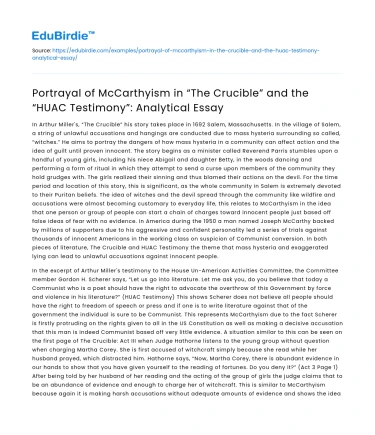In Arthur Miller's, “The Crucible” his story takes place in 1692 Salem, Massachusetts. In the village of Salem, a string of unlawful accusations and hangings are conducted due to mass hysteria surrounding so called, “witches.” He aims to portray the dangers of how mass hysteria in a community can affect action and the idea of guilt until proven innocent. The story begins as a minister called Reverend Parris stumbles upon a handful of young girls, including his niece Abigail and daughter Betty, in the woods dancing and performing a form of ritual in which they attempt to send a curse upon members of the community they hold grudges with. The girls realized their sinning and thus blamed their actions on the devil. For the time period and location of this story, this is significant, as the whole community in Salem is extremely devoted to their Puritan beliefs. The idea of witches and the devil spread through the community like wildfire and accusations were almost becoming customary to everyday life, this relates to McCarthyism in the idea that one person or group of people can start a chain of charges toward innocent people just based off false ideas of fear with no evidence. In America during the 1950 a man named Joseph McCarthy backed by millions of supporters due to his aggressive and confident personality led a series of trials against thousands of innocent Americans in the working class on suspicion of Communist conversion. In both pieces of literature, The Crucible and HUAC Testimony the theme that mass hysteria and exaggerated lying can lead to unlawful accusations against innocent people.
In the excerpt of Arthur Miller's testimony to the House Un-American Activities Committee, the Committee member Gordon H. Scherer says, “Let us go into literature. Let me ask you, do you believe that today a Communist who is a poet should have the right to advocate the overthrow of this Government by force and violence in his literature?” (HUAC Testimony) This shows Scherer does not believe all people should have the right to freedom of speech or press and if one is to write literature against that of the government the individual is sure to be Communist. This represents McCarthyism due to the fact Scherer is firstly protruding on the rights given to all in the US Constitution as well as making a decisive accusation that this man is indeed Communist based off very little evidence. A situation similar to this can be seen on the first page of The Crucible: Act III when Judge Hathorne listens to the young group without question when charging Martha Corey. She is first accused of witchcraft simply because she read while her husband prayed, which distracted him. Hathorne says, “Now, Martha Corey, there is abundant evidence in our hands to show that you have given yourself to the reading of fortunes. Do you deny it?” (Act 3 Page 1) After being told by her husband of her reading and the acting of the group of girls the judge claims that to be an abundance of evidence and enough to charge her of witchcraft. This is similar to McCarthyism because again it is making harsh accusations without adequate amounts of evidence and shows the idea of guilty until proven innocent in the wake of mass hysteria.
Save your time!
We can take care of your essay
- Proper editing and formatting
- Free revision, title page, and bibliography
- Flexible prices and money-back guarantee
During the series of trials being held in Salem, Giles Corey, who is a elderly inhabitant of Salem, as well as his wife were both accused of witchcraft and later sentenced to death. For Giles, he refuses to answer the court when asked about his personal information, “I will give you no name. I will stand mute.” (Act 3 Page 6) Similarly to this in Arthur Miller’s Testimony, “Miller gave the committee a detailed account of his own political activities, but the chairman demanded that Miller give the names of others, thus reneging on his earlier promise. Miller refused to comply, remarking, ‘I could not use the name of another person and bring trouble on him.’” (HUAC Paragraph 3) Miller was later sentenced to prison and even stripped of his US passport due to contempt of Congress. Similarly to McCarthyism, both of these men were being charged with an offense when there is little to no evidence against them, but due to their choice to respect the privacy of themself or others they were sentenced to prison or death.
In conclusion, in both of the two pieces “The Crucible” and the “HUAC Testimony” McCarthyism is shown. Firstly, the Congress in the case of Arthur Miller, and the Court in the case of Giles Corey, have made harsh accusations on these individuals with no reason. Additionally, when individuals are being charged with a ridiculous offense with little evidence and they choose to respect privacy and go against the word of either the Court or Congress they are punished. In both texts, the authors show that in a time of mass hysteria accusations and charges can be put on anyone and how governments could strip those of their rights.






 Stuck on your essay?
Stuck on your essay?

